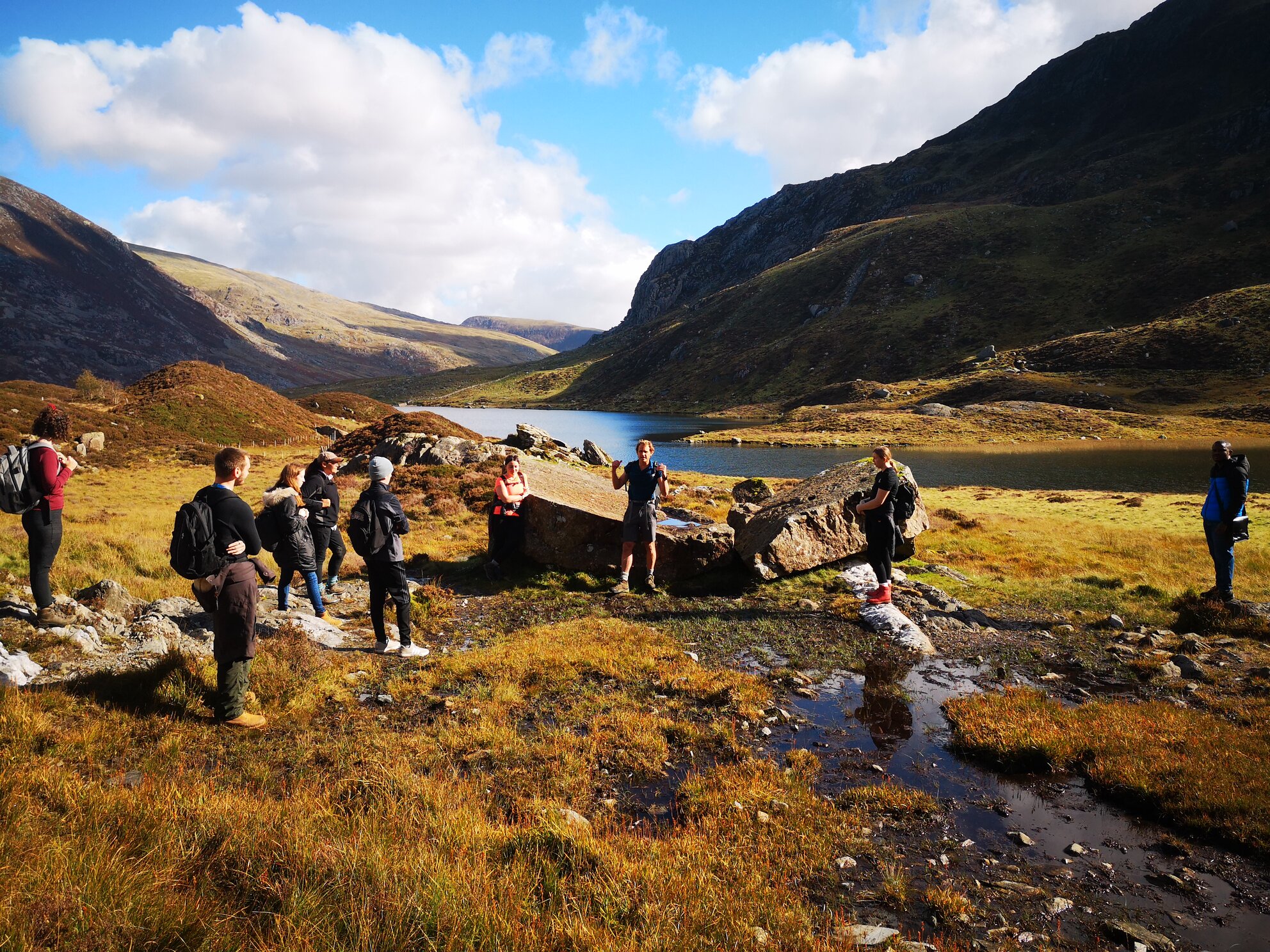
Welsh universities implement innovative blended learning approaches
As we begin the new academic year, universities have worked hard to put in place blended approaches that ensure they can continue to deliver high quality, engaging courses while complying with public health regulations and prioritising the safety and wellbeing of staff and students. A blended approach combines in-person, on campus provision and remote online learning.
9 October 2020
Below are just a few examples of the innovative blended learning activities that have been developed by universities across Wales.
At Aberystwyth University, geography students are benefiting from socially-distanced, local fieldwork, combined with online study. Those studying the physical analysis of natural materials are going on social-distanced fieldwork trips to local sites to analyse and study sediment, supplemented with online pre-recorded material. Students who cannot attend for health reasons are provided with pre-recorded material and high-resolutions images of sediment that they can examine in their own time.
Students studying glaciers and ice sheets at the University will benefit from a ‘virtual fieldtrip’ to examine Cadair Idris, a site known for its glacial history. Students are able to visualise the landscape at various locations digitally, using short videos of the walk up to the sites, a wide array of imagery of the Cadair Idris landscape, GoPro360 image spheres, and narrated footage. These will be combined with existing aerial imagery, satellite imagery, a high-resolution digital elevation data set, and published maps and research papers that describe and discuss the site. This self-directed activity is supported through four computer practicals, each aligned to key milestones that the students are asked to achieve.
Third year Psychology students at Bangor University can choose how they follow lectures to suit their learning styles- by watching a video, following a fully interactive presentation or accessing an interactive online document. The content is followed up the following week with a live online workshop. On-campus workshops are also available, and with staff and student safety an absolute priority, these take place with students in face coverings at all times and spaced with a two metre distance between individuals.

Small groups of Conservation and Environmental Management students were also able to experience the annual field trip to Cwm Idwal, a nationally important biodiversity and conservation site within the Snowdonia National Park. The School of Natural Sciences was determined that this vital outdoor classroom experience should continue safely, despite the challenges. Crucial elements were that there were no large groups potentially disturbing local people and other users of the site, and that students were transported and taught safely.
A whole cohort of first year students have been enjoying the autumnal sun in the suite of Outdoor Classrooms, situated in the Outdoor Learning Centre at Cardiff Metropolitan University. The students and the programme team have fully embraced the ‘hybrid approach’ blending induction activities, learning and teaching online with in person tuition. As well as the sessions indoors, the course staff and students have co-constructed sessions within the ancient strip of Welsh woodland on Cyncoed campus, ensuring lively social learning with physical distancing maintained in a rich and safe learning environment.
Cardiff Metropolitan University has also built a ‘hybrid flex’ approach as standard throughout the School of Art & Design which allows all students to work at their own pace in recognition of individual circumstances. The School has given students complete autonomy by allowing core learning to happen in their own time, placing greater emphasis on more meaningful group learning for on-campus activities. The School has taken the opportunity to future-proof both the curriculum and graduate skillset with enhanced entrepreneurial opportunities and live projects with national and international clients delivered via Teams.
Cardiff University students in the Schools of Medicine (year 3 clinical teaching), Dentistry (years 1, 2, 3 and 4 lectures and practicals), Healthcare (Midwifery, Nursing and Physio practicals, and lectures for Occupational Therapy) , Optometry (NHS clinical sessions) and Law (CPLS Bar Course) have all commenced their studies. Over the past two weeks students have successfully engaged in both online learning and small group face to face teaching on Cardiff’s Covid-safe campus. Feedback received from students has been positive.
In place of the usual on campus welcome week, the School of Management at Swansea University held an online induction for new undergraduate students. Over 500 students attended bite-size skill sessions, student led top-tips, programme briefings and departmental inductions; all with the aim of helping students to maximise their potential during their first year at university and beyond.
During the week the School of Management also hosted an online development workshop with Admiral Financial Services Limited. A senior leader from Admiral facilitated a real-world problem-solving session giving students insight into a large organisation as well as the opportunity to collaborate with other students across the School.
The University of South Wales has implemented DEAL (Digitally Enabled Active Learning Framework), to ensure a rich and engaging blend of remote and on campus delivery. Since July, nursing students have been working in this way using the simulation centre to undertake face to face practical training, as well as having sessions delivered remotely.
Creative industries students have benefited from design thinking workshops, technical inductions, drawing classes, technical masterclasses, and group induction activities since they have been back on campus, which have supported students in establishing friendships, collaborative partners, and future professional networks.
Final year students at the Royal Welsh College of Music and Drama are in online rehearsals for short films, specially commissioned from major writers including Moira Buffini and Simon Stephens. These shortly go into filming following strict social distancing rules. Second year students at the College are working 50 % face-to-face on a Shakespeare in performance project, with the remainder of the course taking place online.
The University of Wales Trinity St David has implemented a new Digital Skills Framework and has worked in partnership with Microsoft to enhance the blended-learning experience. Students across the programmes have accessed a combination of online and in person teaching. In response to the current employment context, the University has introduced common modules to be delivered online across its undergraduate programmes which aim to develop students’ competencies via the three key Graduate Attributes of Employability, the Acquisition of Digital skills and how to become Lifelong Learners.
In addition, students who are studying professionally focused programmes including Performing Arts, Art and Design, Sport and Exercise Science, Education, and Engineering are able to use the necessary physical facilities in a safe manner. Timetables have been developed to enable the best use of these facilities which enable social distancing as well as regular deep cleaning in such areas. The University is also working closely with placement providers to ensure that students can continue to gain vital professional experience in a safe environment.
The Physiotherapy programme at Wrexham Glyndŵr University has been relocated into the University’s larger Human Performance lab so that students can safely participate in practical sessions with the use of personal protective equipment. Physiotherapy students benefit from the University’s Active Learning Framework by completing digital activities, both synchronously and asynchronously, before attending their practical sessions, maximising their learning.
At this difficult time, being able to offer our students an engaging, high quality education is more important than ever.
No matter how our courses are delivered, universities are supporting students to meet their learning objectives and progress so that they can achieve their career and life goals.
